#hero's journey
Text
haha yeah i'm going on a hero's journey, no i'm not gonna fundamentally change after going through trials and tribulations. i'm gonna return home the same as i was, loser
575 notes
·
View notes
Text
emma is the villain of tgwdlm
I need to talk about this oh my god
because it's told from the hive's perspective. paul is the protagonist because he is the one who resists them but must ultimately come to accept that they're right. emma is the one who must be beaten through force.
the difference between the hero and the villain is that the hero must change, while the villain cannot. (I'm not speaking in universals here, just generalizations of how the narrative structures work that tgwdlm uses in parody.) the hero and the villain both hold a belief that represents the thematic evil; by the end of the story, the hero must undergo apotheosis, which is to say, ultimate unity with the thematic good. once this is achieved, he can defeat the villain, who represents the thematic evil completely and is incapable of change.
to the hive, "good" is unquestioning conformity to the group's ideals, specifically, singing and dancing in sync with everybody else. "evil" is refusing to sing and dance along when, clearly, you want to.
paul is the perfect protagonist because he resists song and dance, but largely because it makes him uncomfortable. getting out of your comfort zone is necessary for change! it's a good thing to let yourself go through something uncomfortable in order to come out the other side better and stronger for it. (that much is true; however, sometimes discomfort is a legitimate sign that you should stay away from something.) paul has never really tried singing or dancing, and deep down, is afraid that if he tried it, he might like it. exactly the sort of person who can be converted and used as a shining example of the hive's righteousness.
emma must be the villain because her refusal to fall in line is a choice. she can sing, she can dance, she was in brigadoon in high school and she fuckin killed it, she is even taught a whole ass song with choreography by the hive on their first morning in hatchetfield (emma's comment about how they have to sing "all the time, apparently!" and zoey's implied presence at the theater when the meteor hit - because she was with sam, and sam was there - strongly suggests that nora and zoey were zombified all morning and she had no idea). it's stated by hidgens and suggested by nora and zoey that getting a human to sing/dance along with them is supposed to be a sort of mesmerizing tactic that the hive uses to start synchronizing a person to the hive mind, but emma refuses. she sings and she dances, just like they want, but she chooses to actively hate it the whole time, on principle. she can't be convinced; they have to swarm her, surround her on all sides. let it out is meant to win paul to their side; inevitable is just to gloat.
in the bar scene in hidgens' bunker, emma says that she must be the villain to paul's hero because she was in the musical that got him to hate musicals. on the one hand, she had it backwards; she's the villain because according to the hive, the all-encompassing narrative power, he's not supposed to hate musicals. on the other hand, she's kind of right: paul is the protagonist because he is the guy who didn't like musicals, while emma is the villain because she has the capacity to like musicals as well as experience in them, but has chosen to reject them.
who is the hero and who is the villain all depends on who is telling the story. and the hive is telling this story. don't forget that.
#starkid#team starkid#the guy who didn't like musicals#tgwdlm#media analysis#literary analysis#hero's journey#tgwdlm emma#tgwdlm paul#emma perkins#paul matthews#lauren lopez#jon matteson#nick lang#matt lang#jeff blim
304 notes
·
View notes
Text
Andor recontextualizes the whole original trilogy, to the point that it actually makes me like it more. Like originally, A New Hope and the rest are just a standard hero's journey/chosen-one story about some dude who does training montages and then kills an evil wizard. But when you add in Andor and Rogue One, you have an entire history of the struggle to build and the struggle to destroy the Death Star. You know the many who fought and died over decades, what the existence of the Empire actually means, and what they want to do with the Death Star once finished.
Suddenly Luke isn't some magical boy, he's just a specially talented, well-placed person. He stands on the shoulders of millions who died to get him to where he needed to be so he could do the thing they needed him to do to alleviate everyone's oppression. According to Rogue One he's not even the only person with jedi potential in the resistance! He's just the only one to get any real training or equipment. Luke may be important, but he's not special. The whole saga makes Luke feel normal, and it does so by populating the universe with heroes.
This is the ideal of what prequels should be: standing strong as stories in their own right, while adding to the narrative power of the original story by giving it more context.
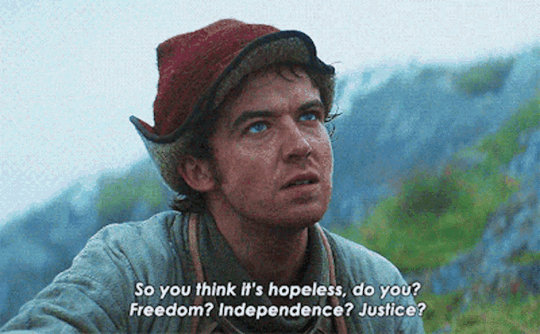

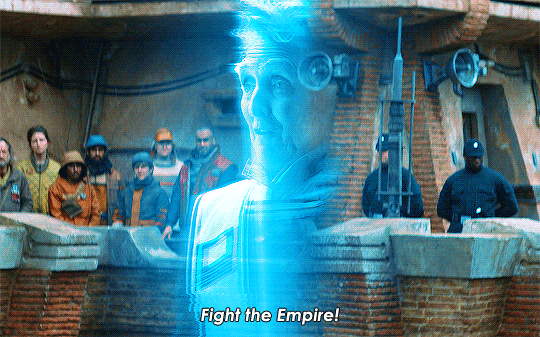







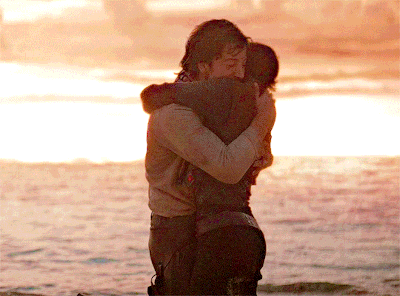
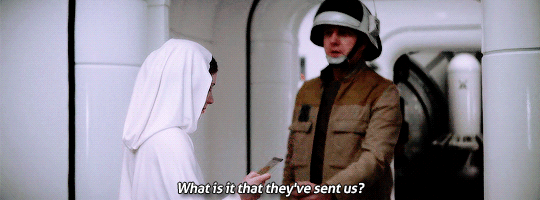
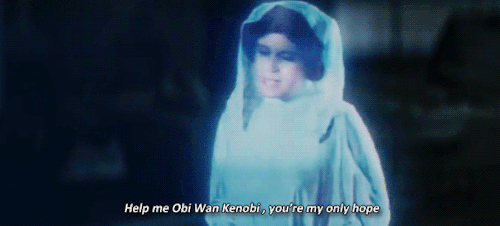

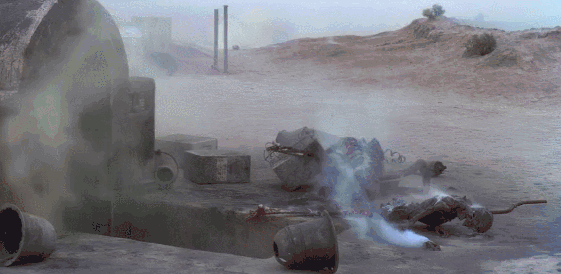

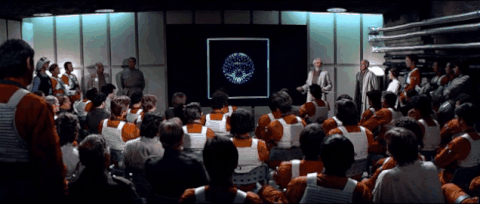
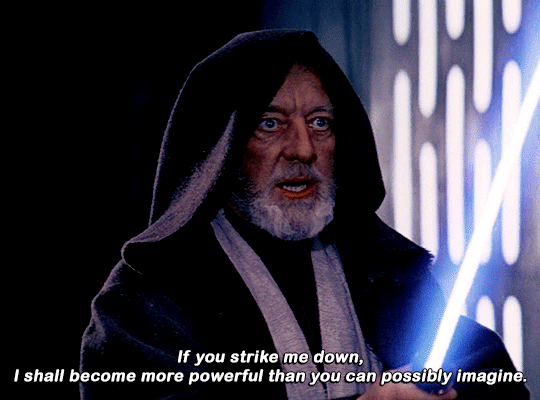

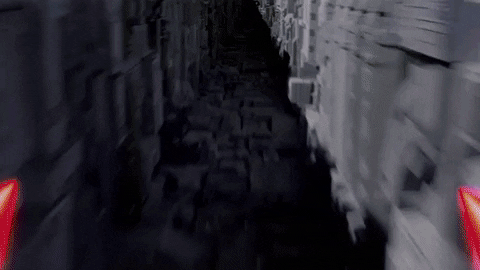
#Star Wars#Andor#Luke Skywalker#A New Hope#Rogue One#Prequels#hero's journey#resistance#Fascism#Jedi#Cassian Andor#Princess Leia#Obi Wan Kenobi#Ferrix#Kino Loy#Saw Gerrera#Galen Erso#Jyn Erso#Admiral Raddus#Death Star#Chirrut Imwe#Maarva Andor#Karis Nemik
3K notes
·
View notes
Text
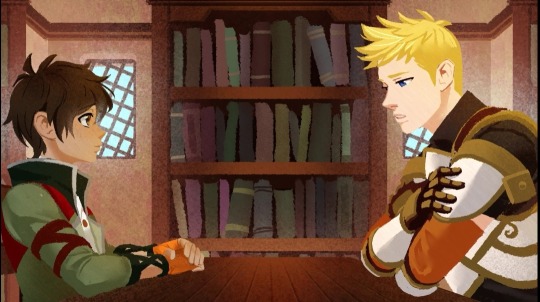
Them Bois!!! So glad to see them talking and sharing their experiences!
I think they're really setting up an Oscar and Ozpin focused arc in the future (pardon my pun), where the merge will probably be stopped after coming very close to finalize. There's a sense of melancholic finality about Oscar but still both him and Ozpin are fighting to delay the process and their past and new friends (like Neptune and Sun in the past episode) keep differentiating between them, in a way helping them regain what sense of self they have left.
And it's really interesting to see Oscar as a part of JNPR but in a very special way. He feels like part of the team more than ever now, not entirely because of himself but not entirely because of Ozpin either. Wonder if the rest of RWBY beyond is gonna show us more interactions.
Also interesting how Oscar is adopting Ozpin's mannerism and speech. Does that mean that Ozpin, before the merge, didn't speak that way? It's an Oz thing, not an Ozpin thing? Mmmhhh.
113 notes
·
View notes
Note
Just pitching in since I see so much discourse about will they or won’t they that I think we kind of lost the essence of the story: I mean yes, Netflix is promoting the whole are they going to be endgame or not, tune in to find out but I think that’s just a generic marketing tactic.I’ve honestly been ignoring it.
Also, Lisa doesn’t strike me as the type of writer that would push only her own personal agenda or politics to a tv show, especially one that has critical acclaim as yr. That’s not what true storytelling is about. Please bear with me (apologies in advance for the long response !) but here’s my v long winded reasoning:
The theme has always been love v. duty & the monarchy is the enemy. Wille is on a Hero’s Journey - he is ultimately the Main Character; the Young Royal. What’s great about The Hero’s Journey is that it’s easy to follow and makes for great storytelling despite its predictability. I think some people here may have touched upon this so I am simply expanding:
As a viewer, we follow Wille and get to know him. He’s a likable character and we easily root for him and feel for him when we learn about the power dynamics in play; specifically how he feels caged as a prince. Then we enter into a Call for Adventure: him falling for Simon and the high stakes he enters when his brother passes and he is now Crown Prince.
This, then, propels the story forward, given the stakes are stacked up and it’s not looking good for Wille, especially after he/we find out August was the offender for sex tape leak.
After that, we enter into The Refuse to Call for Adventure; i.e, the hero (Wille) realizes he must face the challenge. We also step into the Meeting the Mentor, which is Boris, who helps Wille learn how to stand up and ultimately fight for himself (and Simon). While I see others thinking that W might push everyone away, including skipping his appts with Boris, I do not think that’s the case. Boris was set up to be the Mentor that W needs to realize the challenge he’s been facing and we may continue seeing him open up to Boris.
This will then allow W to “Cross the Threshold” and reinforce the central theme and conflict of the story - if W continues to stay with the monarchy and his obligations as Crown Prince, he cannot choose Simon. Love or Duty? Which will prevail?
S3 crosses that threshold and produces tests and obstacles that would make the fight for his relationship w S so much more complicated (basically everything we saw in the trailer). This stage in the Hero’s Journey is meant for the audience to doubt the Hero - Wille. It’s already a testament as we are debating if W is going to denounce his title or not just from the 2 mins of what we saw from the trailer. It’s intentional. We need to doubt in order for the central theme to drive home and also portrays the monarchy to be the overarching enemy of this story, without Lisa forfeiting her own political statement.
We enter the next stage of the Journey - which is the Cave - meaning the Hero and protagonists need to regroup and prepare for a counter attack (generally speaking) because the tension is continuing to rise and there are outside forces that wish to disturb the Journey (in this case, public opinion? paparazzi? Hillerska shutting down?).
Next, we enter the Ordeal - which makes the Hero break down bc he enters a mental barrier and is pushed to a corner. However, the Hero, typically comes out stronger after this stage in storytelling.
Ultimately, we reach the end: The Reward. The Hero makes the “attack” or choice and defeats the enemy/antagonist.
Imo, with how everything is set up, I do think it’s set up for W and S to be together in the end at least the end of the show (everything else after is obviously left for the audience member to interpret).
I have no doubt that W & S are going to come up on top and still be together in the end bc like some people mentioned - what would be the point? It was never a question whether they would end up together. The question is if Wille, our Hero in this story, would make the final choice and choose between love or duty. I think Wille would choose love. What better way of making history, especially with everything that’s been happening in real events, then choosing love? That would make for a strong ending.
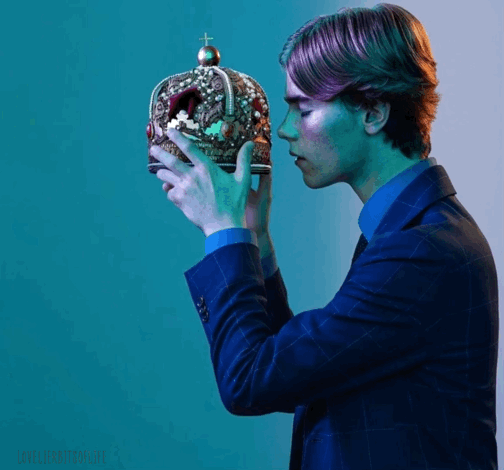
#young royals#hero's journey#wilhelm#yr s3 spoilers#s3 speculation#wilmon#wilmon endgame#love or duty
74 notes
·
View notes
Text
Love spotting the heroine's journey in film & hoping to see it in barbie
#video#tiktok#tiktoks#movie#movies#film#films#barbie#barbie movie#barbie the movie#hero's journey#heroine's journey#writing#jstoobs
315 notes
·
View notes
Text
Immense love for all those authentic souls who openly wear their big hearts and unwavering integrity. These courageous, generous, compassionate beings facing and embracing the entire world without fear or reservation.
93 notes
·
View notes
Text
Crutch Tropes #1: “I just want to be normal.”
One cannot write a sensical story that is completely devoid of tropes, much less completely immune to the audience presuming tropes whether you intend them or not. In short: Tropes are not, and have never been, the “problem”.
The problem isn’t even that some become clichés. The problem is when writers use tropes in place of actual character development and detail, because they think just stamping the trope on the page suffices. This isn’t usually done maliciously, either, it’s from inexperience at best, or ego at worst.
Every trope can be a writing crutch—as in, its mere existence gives the illusion of depth where there isn’t any—but there’s a whole subset of tropes that become annoying and exhausting clichés when they don’t have to be. I think they can still be implemented as solid story and character choices with a little TLC thrown their way.
I already wrote about lacking buildup for major character beats and how they’re clearly written to make the audience angry or scared or to pick a side or fall in love, and here is one of the most egregious.
—
No one who’s just been shown the secret otherworld of every fantasy reader’s dreams wants to be “normal”. This line gets thrown around to drive early conflict between the reluctant chosen one and their new badass friends, as if entering this new otherworld or accepting these new powers or responsibilities in any way makes their generic and “normal” life worse.
The writer knows this, otherwise they wouldn’t be banking on the super cool awesomeness of the world they just created to sell books.
The best instances of this trope are well into the story where the character can see and has likely suffered the downsides of this otherworld. Or, a seasoned veteran character comes to terms with the fact that they've given their life to this entity and never got the chance to be normal. By that point, the audience is already endeared to them and right in this mess with them. At the start of the story, we have no idea who this person is.
How to fix: These powers/attention/responsibilities are actually a serious threat and detriment to the character’s ability to live their life and being “normal” is something they have actually never known. “Normal” becomes a gift. Or, the character has a very clear idealized “normal” and the plot is in the way of it.
Without this addition, “I just want to be normal” feels empty and cheap, because most of us readers are “normal”, and can’t empathize with a whining protagonist who we all know will come around eventually.
This trope also loses its teeth when the character cannot define what “normal” they want. Many chosen ones are already written in the midst of their tragic backstory and already don’t live an average life compared to the average reader, but they don’t complain about not being “normal” until they’re dragged out of their miserable existence into the way cooler plot.
But many chosen ones are also just average people, who inexplicably turn down amazing adventures because they just… really want to be homecoming queen, or really love slinging burgers, or taking the bus to school, or doing homework. No one with that life wants to be “normal”, and none of those characters ever articulate just what’s so special about this life.
—
Perfect example of both versions of this solution:
Princess and the Frog: Tiana wants to open her restuarant and wants nothing to do with romance or an adventure. Naveen stands in the way of her "normal" every chance he gets. Tiana's quest is never for romance, it's to undo the magic spell that she got dragged into on accident, and romance is just a happy byproduct.
The Lightning Thief: Being a demigod sounds cool, but the survival rate of these tragic heroes into adulthood, much less 16, is very low, and the book narrative makes it very clear that these so-called heroes are really just beasts of burden doing the gods' dirty work. Percy may not want to continue living exactly the way he is, but at the start of the book, he doesn't give a damn about helping his deadbeat godly dad. When he yearns for normalcy, we can all see why.
—
What is their normal and why do they want it? What are they already doing, or what do they wish would happen, to obtain that idyllic normalcy? I wrote this post about humanizing your characters, and if you’re going to write this blip in the hero’s journey, this is your chance to get as vivid and specific as you can about what this character sees as their perfect life.
#writing advice#writing resources#writing tips#writing tools#writing a book#writing#writeblr#character design#character development#hero's journey
20 notes
·
View notes
Text
I'm looking at this Adrien Problem yet another way.
At the end of Re-Creation, we hear this news clip:
'...because no one teaches us how to understand or deal with them. If we don't listen to what our fears, sadness and anger are trying to tell us....'
This parallels the beginning of Conformation, when the Alliance tells the public that we all have fears and the answer is basically to anaesthetise ourselves.
When Adrien succumbs to his fears and accepts the Alliance antidote, this is him not listening to the messages of his emotions. But he has to if he's ever going to heal and grow. Otherwise, he's just repressed...as usual.
The message at the end of Re-Creation was that Adrien would absolutely give into his negative emotions - that there was no way around this, and that's why Marinette had to face Gabriel alone.
But nightmares are there for a reason. They are the subconscious trying to tell us something important. When we identify the thing we're meant to examine, and we tackle it, the nightmares go away. If we ignore them, they fester underneath and find other ways to come out and hurt us.
Adrien and Marinette's Cat Blanc nightmares persist because neither of them are talking about them. Cat Blanc himself told her she wasn't listening to him as he tried to explain what had happened. Interestingly, Marinette switches off the news before hearing the full message. And by putting on that Alliance ring, Adrien isn't listening either - to himself.
He never went into the Innermost Cave faced and embraced his Shadow side, and therefore never came back to the world with greater wisdom gleaned from that experience. In fact, he's not even in the world he started in, because it's all been changed. It means he's still a very broken hero on an ongoing journey.
Again, I just hope hope hope this means they have plans for him in future seasons. Seeing all those other heroes added back to the team at the end made me worried he would be sidelined again - but maybe not. They still have to deal with the rest of the love square - and his story is very much not over, by any classic writing standards.
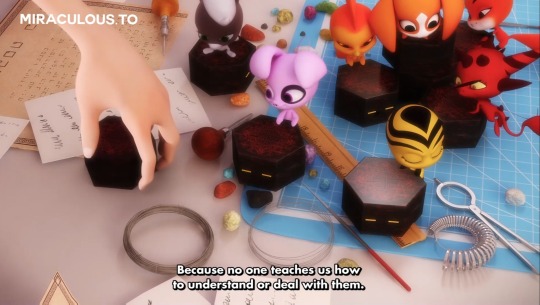

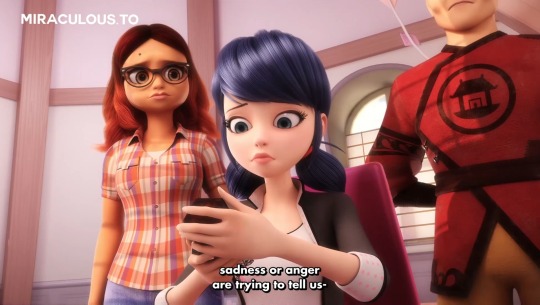
#miraculous ladybug#mlb#adrien agreste#chat noir#cat noir#ml marinette#ml adrinette#ml s5 finale#ml s5#ml recreation#ml conformation#ml meta#ml analysis#ml thoughts#hero's journey#ml fandom#ml adrien#cat blanc#chat blanc
82 notes
·
View notes
Text
my nephew has to do a school project about the hero's journey by joseph campbell. as we helped him brainstorm, i was about to go feral with sam winchester examples
19 notes
·
View notes
Text
you have two wolves inside you. one recognizes that the point of the hero's journey is to go on the journey and return having changed, and therefore respects suzanne collins for having gregor leave the underland behind him forever. the other really wants gregor to go back to the underland and stay there and marry luxa and be king of regalia in a time of lasting peace. you are gay
#the underland chronicles#gregor the overlander#return to regalia#off topic but this is one reason i really don't like the way harry potter ends#he just leaves everything about the muggle world behind and stays in the magical world forever#like girl... the point of going to the unknown world is to find the thing which helps you solve the problem you have in the known world#it's like you haven't even READ the hero with a thousand faces#hero's journey
65 notes
·
View notes
Text
So sick of hearing bs from dudebros that minimise Katsuki's importance to the plot.
Katsuki IS the central plot.
I'm not kidding. This is an enemy to lovers romance set in a superhero world.
And our hero doesn't have to be conciously aware of they're in a romance story with their antagonist from the beginning. They in fact, typically, don't get it.
Now any half-serious writer knows about 'The Hero's Journey'. A guide to plotting out the narrative and developing the protoganist.
Every hero has to follow this. A writer may wiggle some things around to spice it up, but this is the blueprint they have to cover. It sets the entire plot direction. The purpose of our hero's story.
What's unusual is that the plot in MHA is deliberately misdirected by a dream to be a hero, and an eventual showdown with AFO. But I'm going to tell you the central plot is:
Protect/Save Katsuki.
He must win over Katsuki, be equal to Katsuki, and ultimately save Katsuki.
Our protagonist refuses to voice this desire, but he is very aware (now). He does reach a moment of clarity and self-honesty (after lying about why blackwhip was activated), and from that moment on, we lose all narrated insight of his thoughts about Katsuki.
The story moves forward as though it's something else, but still critically revolves around the two of them. Everything else that happens is a sub-plot for other character development, or a plot-driver for their relationship.
What steps are in The Hero's Journey that make me think this?:
Introduction -Ordinary World
Call to Action/Adventure
Refusal of Call
Meet The Mentor
Accepting the Call/Crossing the Threshold
Let's have a look:
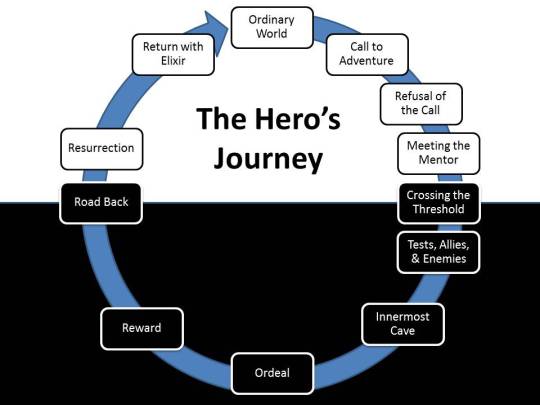
First we have an Introduction: Ordinary World. The world as it is in the beginning for our protoganist, inlcuding our first insights into their existing problems and inadequacies. Things they will need to overcome by the end of the story.
And here's Izuku's Ordinary World:

Izuku's ordinary world is introduced with his terrible relationship with Katsuki, and his quirkless inadequacy that feeds into this. He is not born equal to others, and most critically, not equal to Katsuki.
Next is Call to Action (Adventure). The hero is compelled to rise to meet the crisis.
Izuku's Call to Action:
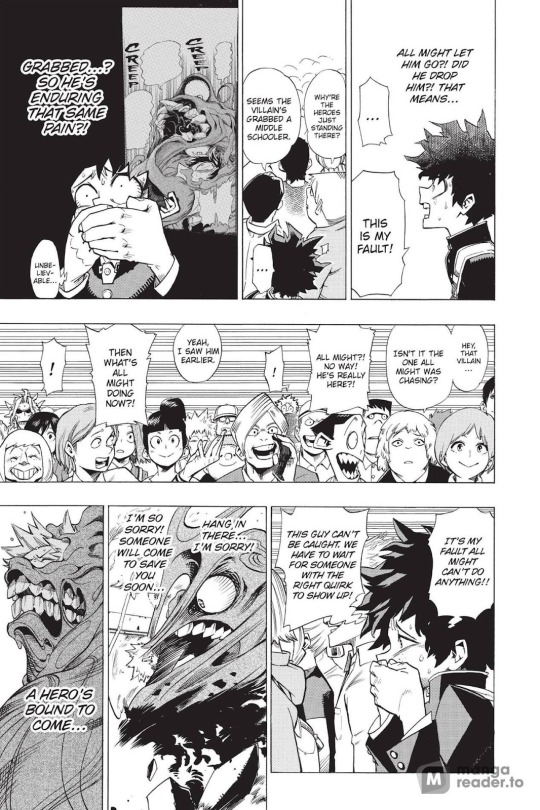
Someone is being killed. Smothered. It's Izuku's fault.
He accidentilly released the sludge villain while begging to become a hero to All Might. Izuku knows someone has to act right now, the kid is suffocating just like he was when he was attacked by the same villain earlier. His actions caused this, and he doesn't move. He tells himself he can't do anything.
All hero's narratively have to reject the first Call to Action.
Refusing The Call:
He doesn't act, he waits for a hero. Without a quirk, he can't do anything.
You'll notice on our Hero's Journey wheel what is supposed to happen next is Meet The Mentor.. But this step has happened already. We know Izuku meets All Might before any of this happens. What the?..
Yes. Horikoshi subverted the Hero's Journey by having Izuku meet All Might BEFORE The Call to Action. And All Might REJECTS him.
It allows Deku to go straight from clearly Refusing The Call to Avtion, to Accepting The Call (or Crossing The Threshold), which a Hero only does because something critical has changed to move them into action.
Accepting The Cal/Crossing The Threshold:

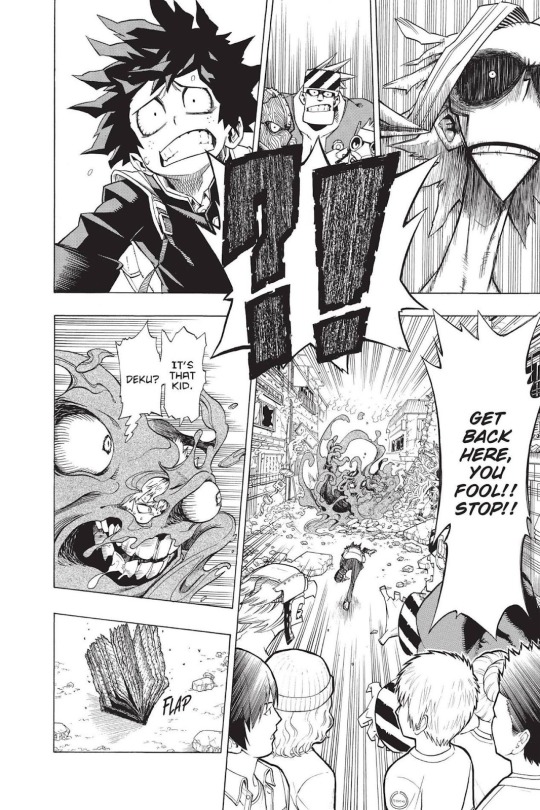


Despite resolving to give up on his dream to save people, accepting he will never be equal to Katsuki, Izuku answers The Call by saving Kacchan, *BECAUSE* it's Kacchan.
Kacchan is Deku's critical motivator, our turning point. The Call turned out to Katsuki, and it changes everything. He answers this time without hesitation.
Some are going to argue that it's because of his 'save me' eyes, and it could have been anyone needing saving. If that's true, then Horikoshi could have made it anyone else. But he didn't, because it had to be Katsuki to set and drive the plot.
Narration: There were any number of reasons [one of is simply "Kacchan"]. But at that moment...
"YOU..."
"You look like you needed saving."
The first "You.." in a bubble all on it's own, is not an accident. There are no accidents in storytelling. It's the answer.
"There were any number of reasons. But in that moment... You..."
The Call is not becoming a hero, because Izuku never refused to be a hero. He has PURSUED being a hero his whole life. Aggressively. Painfully. Dellusionally.
He is ALREADY a schoolyard hero -even getting beaten to defend others. It's a huge dream, and Izuku will wreck himself over it, but it's not The Call.
It serves as his growth journey to become worthy and equal, and it's a high-stakes commonality to develop the relationship with Katsuki. There's plenty of subplot, explosions, noise and badassery here to enjoy as well. It also decoys and distracts the angsty-gay-romance adverse very nicely.
Just like in a romance novel where the main character is driven to be the greatest pole vaulter, etc, 'pole vaulting hero' is not THE central plot point, or The Call -even if she has self-doubts at any point about pole-vaulting.
The central plot is the relationship. Always. Pole-vaulting is shared high-pressure to grow as a person, and critically develop the bond with her sexy, amazing, but unreasonably angry, rival, pole vaulter. It's a vehicle. It could just as easily be professional dancer, marketing executive, whatever. As long as it drives the relationship.
Back to Izuku. He may have been heroic "saving" Katsuki, but it was also kind of pathetic. He doesn't "win" Katsuki over, or prove he is equal. Katsuki rejects him immediately.
No hero wins without a boatload of growth and suffering first.
Then we get a do-over of Meet The Mentor. And this time All Might accepts him, praising him as worthy of his dream, because Izuku had already fulfilled Answering The Call.
He gets to be a hero. Most importantly, he gets to go to UA with Katsuki. I don't mean to undermine his growth as a hero, but this career's main point is to drive the physical and emotional stakes skyhigh.
So with the acceptance of The Call, our journey to equality and saving Katsuki, has officially begun...
Katsuki of course, continues to aggressively reject him, but Izuku won't let him go his own way, or back down.
Even as their relationship develops, they won't stop emotionally tormenting each other, even though it's unintentional. Relationship conflict and saving Katsuki is the whole point. Finding their EQUAL place beside each other will be the resolution.
And that's exactly how it's playing out now. They are both in a crisis phsyically and emotionally. Katsuki is at death's door, and emotionally has gone too far in his view of their respective worths, now viewing Izuku as his superior (ref apology). Not equal.
Izuku is making desperate decisions to save Katsuki, like fighting on the ground to keep Katsuki out of the battlefield. He is also aggressively fighting his feelings, because he doesn't believe their feelings are the same.
Saving Katsuki and equality of worth, feelings, and abiliity, will have to be resolved for the story's climax. So I expect we are waiting for below:
*Izuku must save Katsuki.
* Izuku reveals he has been very flawed. Not superior. Eg. Lying. His secret feelings. Losing control. Leaving Katsuki vulnerable. He apologises. They both accept they are both flawed and have hurt each other, but remain each others' hero.
*They realise their romantic feelings are the same. Katsuki will ultimately bridge the gap.
* Katsuki will also need to save Izuku to restore equality.
* They will win the war because they work together, equally important to the victory.
* Enjoy peace and working together dor bright future side by side.
I'm rambling now, but...
There is a strong secondary plot arc, and sub plots. They are ultimately pot-stirrers to our central plot which really is: Protect/Save Katsuki. It is.
Protect/Save Katsuki is why the audeince has akways felt such a sense of unease about Katsuki's vulnerability and safety, despite the rough exterior, because it's the plot. You're supposed to be invested like this.
And Horikoshi continues to naturally progress the narrative along, by repeatedly putting Katsuki in increasing levels of stakes/danger (insulted, kidnapped, speared, "dead").
It's why Izuku had to fail repeatedly to save him, he narratively MUST fail until our climax.
It's why Izuku is increasingly torn up inside, and out of control in his heart to protect Katsuki, because Katsuki is his goal. He had to become increasingly emotionally obsessed with Katsuki as progression to match the increasing stakes to Katsuki's life.
It's also why Katsuki had to grow to love Izuku over time, and then goes too far in his respect/guilt over him as the climax draws near (superior/inferior). He reverses Izuku always chasing him, and instead longs to catch up to Izuku. To be equal, narratively, he should have extreme, tumultuous feelings and experiences to match Izuku's own, so he does.
He is concurrently responding to the same increasing stakes against Izuku's life. He develops a desperate need to also save Izuku. Equal. Equal. Equal.
As clearly identified in our introduction, Normal World, Izuku will need to have fully developed self-worth, and be equal in ALL respects to finally protect Katsuki. Katsuki must equally grow and reciprocate all of it.
MHA is ultimately:
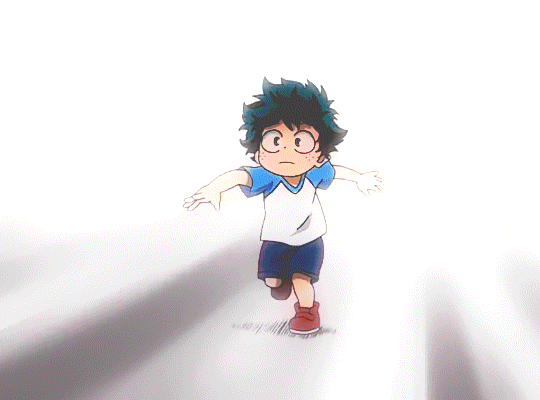
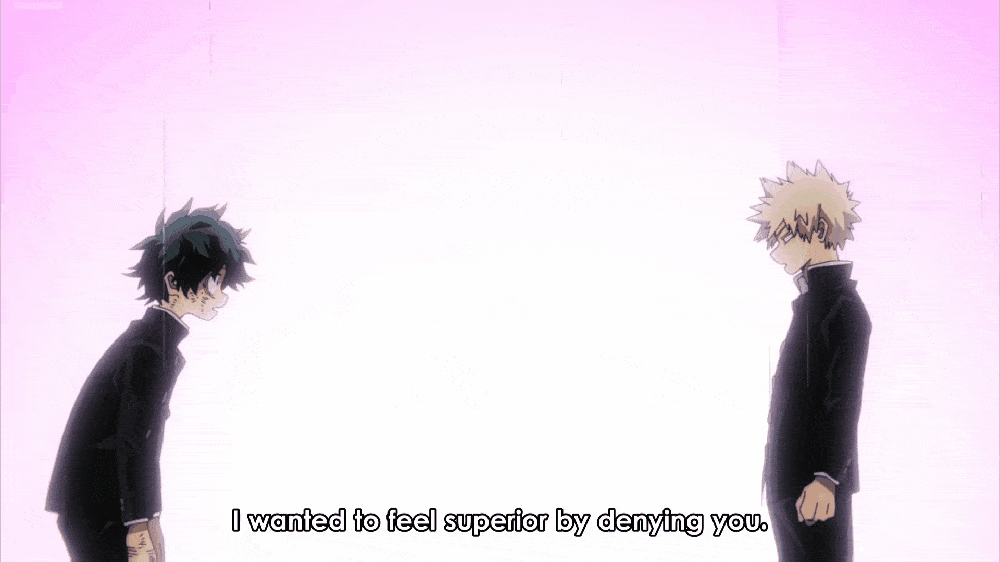

137 notes
·
View notes
Text
Ruby 🤝 Jaune 🤝 Ozpin
Never feeling like they are enough.
Turns out what they all needed was Oscar.
#ruby rose#jaune arc#ozpin#professor ozpin#oscar pine#rwby#rosegarden#hero's journey#oshupin#oz family#rwby volume 9 spoilers#rwby spoilers
199 notes
·
View notes
Text
It’s Time to End the Hero’s Journey
I don’t know about you, but I’ve absolutely had enough of it: the story structure known as the hero’s journey.
It’s everywhere, from Star Wars and Raiders of the Lost Ark to just about every Bruce Willis or Tom Cruise movie you’ve ever seen even through to Barbie and The Hunger Games. A hero is called to action, refuses the call before begrudgingly accepting it, has adventures in which (generally) he is repeatedly tested, receives assistance from mentors and other helpers, is brought low by a nemesis shortly before (generally) ultimately succeeding, and comes home an enlightened person.
Brought to public awareness as a common pattern in myth by Joseph Campbell in his books, like The Hero With a Thousand Faces, it has irritatingly come to take over western, industrialized movie making and mass market fiction. We have even, to a frightening large extent, internalized our own personal narratives as hero’s journeys thanks, in part, to the self-help industry.
But this is all laziness and a terrible failure of imagination. On top of being egotistical and self-indulgent, the hero’s journey is far from the only structure possible for stories. Worse, its sharp focus on the individual and the male experience of heroism, instead of on community or other ways of moving through life, it has us longing for strong leaders of single–minded, masculine vision. And it has us dreaming of ourselves rising the occasion in the fight against tyranny and catastrophe instead of imagining ourselves working together with other people to solve systemic problems before they plunge us into exactly that sort of catastrophe and tyranny.
Oh, Have You Ever Heard This Story Before
Even if you haven’t been formally introduced to it, you encounter the hero’s journey all the time. Lifted from myths like the wanderings of Odysseus, the story of Jonah, the life of Buddha, and many fairy tales, the hero’s journey has morphed into what feels like our default mode of storytelling.
Take the “save the cat” rules for script writing, which are just the hero’s journey template. Just about every Hollywood blockbuster now follows this formula. Not just just about every Bruce Willis and Tom Cruise (and the Rock and Vin Diesel and Liam Neesen and etc) movie ever, but all the super hero movies. Even female protagonists are frequently shoehorned into the hero’s journey template (see: Angelina Jolie in “Salt” and “Mr. & Mrs. Smith”; Katniss Everdeen in the Hunger Games books and films; Mila Jovovich in all the Resident Evil movies; and even the little girl at the heart of the story of “Spirited Away”), as if the only way to be interesting is if you’re a hero just like the guys.
But This Is Not Great
While these stories make for great escapism, they’re not great for actually changing the world.
Look at the sort of places the hero’s journey goes…
At the end of the movie Edge of Tomorrow, it becomes clear that the whole point of Tom Cruise’s character’s saving the world from alien invasion is that he’s learned to be a brave, bold hero, rather than a selfish coward. This doesn’t make him less arrogant, but it means he gets the girl, the satisfaction of knowing he has saved the life of anyone he will ever meet, and a magical fresh start that wipes away the negative consequences of his previous insufficiently heroic behavior.
Or, look at Katniss at the end of the fourth Hunger Games movie (Mockingjay, part 2). She’s sitting in a sunny meadow with her husband and young children. On the one hand, oh, I get it know. This is why ordinary people pick up arms and go to war in the face of a terrible threat. She fought so hard and sacrificed so much, not just for her own survival, but so her as not yet even conceived of children could grow up in freedom. It was all worth it. On the other hand, she’s been transformed from being a fearless warrior, skilled hunter, revered leader, and the chosen one who fomented an entire revolution by staying true to her ideals and made the world safe from not one, but two tyrants into a harmless young mother, utterly unthreatening in a faded, modest calico dress, tending to her husband and young family. The whole point of her journey is that the minute she she doesn’t need to be a strong, fearless, rousing warrior anymore of unprecedented skill with a bow and arrow she can happily settle into domesticated bliss, aside from a bit of PTSD? That, deed done, she can now settle into the fate she was truly made for, that of being tame and ordinary and enjoying her subservient place in the patriarchy? I mean, ARGH!
And then there’s “Oppenheimer”, which took the incredible story of everyone and everything that converged to create the atomic bomb, drop it on Japan, and start the Cold War and turned it into the personal hero’s journey of one man. So ridiculous and, frankly, so meh. Go read The Making of the Atomic Bomb by Richard Rhodes—which is one of the best books ever written—if you want your mind properly blown by this story. Sure, his story of the endeavor is way more challenging to the reader—you’re going to be exposed to actual information about atomic physics— than the celebrity biopic approach. But you get so much gain for your pain if you push through the reading of the story. You’ll learn so much of the history of the chemistry of the elements that make up existence, of the various genius scientists (all of whom were some pretty interesting characters) involved in the advancement of nuclear science and the Manhattan Project, and you’ll truly feel the horror of the scientists when the military comes along and takes the product of their hard work to save the free world and doesn’t give them any say on how it will be used. But Oppenheimer (in the movie about him). Oh, poor guy, gets his name drawn through the mud by a political nemesis and is a bit sad when all the people die when the bomb is dropped. Sheesh. Doing its sad little treading of the boards in the shadow of The Making of the Atomic Bomb, Oppenheimer is the perfect example of how limited, narrow minded, narcissistic, and shallow the hero’s journey approach can be compared to other ways of telling the story.
We Should Be Telling All Sorts of Stories
Honestly, these hero’s journey stories aren’t the only kinds of stories we should be telling—either within in the genre of solarpunk or not. Not only is all this heroic journeying getting boring, there are major downsides to locking ourselves into this single vision of story. Like becoming fans of authoritarianism and monarchy.
David Brin had some great words about how Star Wars’ use of the hero’s journey results in main messages that are authoritarian and undemocratic, leading us, for instance, to forgive—and even fete—great evil, despite the millions of death that person (Darth Vader) has caused, so long as he performs a personal act of redemption in the end. Star Wars and its hero’s journey involving the Skywalkers has us cheering on people with a magical hereditary right to power, as if we’re fine with consigning basically everyone else to be followers.
Jo Walton and Ada Palmer also touched on the down sides and limitations of the hero’s journey, at least adjacently, in their editorial in Uncanny Magazine that called for more stories that don’t center on a single protagonist, called to action, from whom all change unfolds. Using history as their example, the point out that events generally happen because of the actions of the many, not just of one special single person. I might add, when big outcomes do hinge upon the actions, leadership, and unique talents of one single person, it’s generally someone despotic, like Hitler or Stalin. And, as pointed out to us by one of our listeners, Jon Ronson has a great podcast with one episode in particular about how trying to understand your own life as a hero’s journey can lead you to brainwash yourself straight down a rabbit hole of conspiracy theories, until the call to action you hear is to undermine, if not actually overthrow, democracy.
To the Typewriter Computer, Solarpunks!
Here’s my call to action by you. Let’s let solarpunk stories dump the hero’s journey, even as a means to explore life in a solarpunk future. Let’s use all the other story structures instead.
Let’s tell stories about endeavors—like the making of the atomic bomb—not about a person undertaking an endeavor—like Oppenheimer herding his cats at Los Alamos.
Let’s tell stories about relationships between people, or between a group of people and the natural world.
Let’s tell stories where the actions of an individual on his, her, or their own never advance the plot.
Let’s tell stories about moments, or about conflicts, where what’s interesting is the development of the moment or conflict, not of the protagonist and antagonist’s paths through them.
And when we do tell stories about a single protagonist, let’s not keep religiously following the structure laid out by Joseph Campbell and copied by save the cat.
Not every protagonist needs to be a hero! There are so many other arcs to follow.
32 notes
·
View notes
Photo
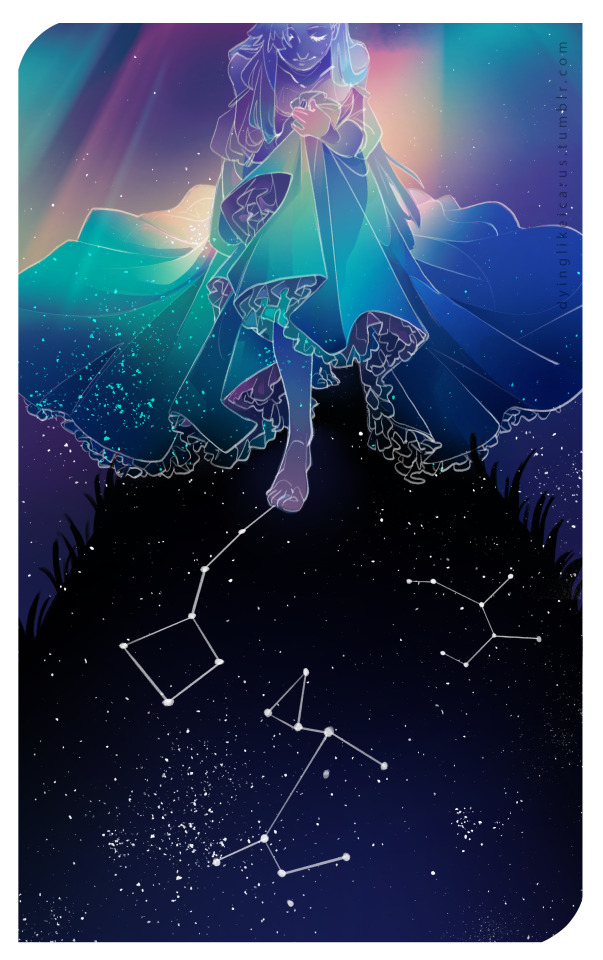
0. THE FOOL
Sometimes I think of doing a tarot inspired by Greta’s arch and see how the jungian theory of the journey of the hero around tarot would look like.
378 notes
·
View notes
Text

been thinking about percy jackson (i am new here)
16 notes
·
View notes